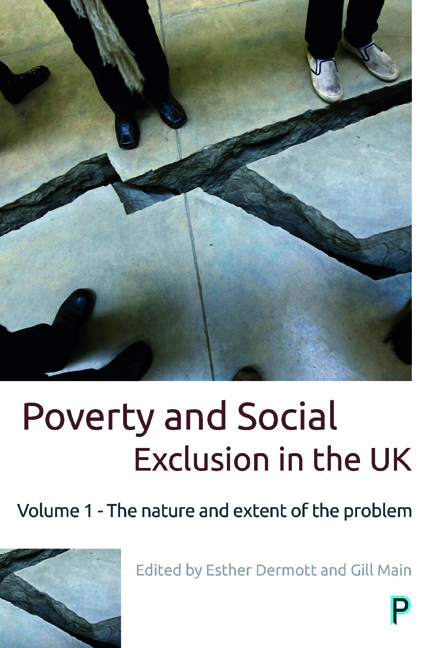Book contents
- Frontmatter
- Dedication
- Contents
- List of tables and figures
- Notes on contributors
- Acknowledgements
- Introduction: poverty and social exclusion in the UK
- One Measuring poverty in the UK
- Two The impoverishment of youth: poverty, deprivation and social exclusion among young adults in the Uk
- Three Improvement for some: poverty and social exclusion among older people and pensioners
- Four Which men and women are poor? Gender, poverty and social exclusion
- Five Better understandings of ethnic variations: ethnicity, poverty and social exclusion
- Six Improving lives? Child poverty and social exclusion
- Seven The cost of children: parents, poverty, and social support
- Eight A worsening picture: poverty and social exclusion and disabled people
- Nine Devolution and North/South division: poverty and social exclusion in the countries and regions of the UK
- Ten More similarities than differences: poverty and social exclusion in rural and urban locations
- Conclusion: innovating methods, informing policy and challenging stigma
- Technical appendix
- Index
Seven - The cost of children: parents, poverty, and social support
Published online by Cambridge University Press: 08 April 2022
- Frontmatter
- Dedication
- Contents
- List of tables and figures
- Notes on contributors
- Acknowledgements
- Introduction: poverty and social exclusion in the UK
- One Measuring poverty in the UK
- Two The impoverishment of youth: poverty, deprivation and social exclusion among young adults in the Uk
- Three Improvement for some: poverty and social exclusion among older people and pensioners
- Four Which men and women are poor? Gender, poverty and social exclusion
- Five Better understandings of ethnic variations: ethnicity, poverty and social exclusion
- Six Improving lives? Child poverty and social exclusion
- Seven The cost of children: parents, poverty, and social support
- Eight A worsening picture: poverty and social exclusion and disabled people
- Nine Devolution and North/South division: poverty and social exclusion in the countries and regions of the UK
- Ten More similarities than differences: poverty and social exclusion in rural and urban locations
- Conclusion: innovating methods, informing policy and challenging stigma
- Technical appendix
- Index
Summary
Introduction
Parental behaviour and parents in general have not been of interest in previous poverty surveys; a fact reflected in their omission from publications based on earlier Poverty and Social Exclusion (PSE) research. What justifies their inclusion this time is a changing popular, political and policy climate which has placed parents and their behaviours as centrally important to current and future levels of poverty in the UK. Parents are now framed as both the cause of, and potentially solution to, child poverty in a way not previously witnessed (Dermott, 2013).
Parents’ experience of poverty and social exclusion
Parents are generally at higher risk of poverty than non-parents because of the added financial cost of children (Misra et al, 2012). In the UK, it has been argued, that this is at least partly due to a process of ‘defamilization’ (Lewis and Giullari, 2005), which has meant that private formal childcare plays a significant part in many families’ organisation of care (albeit as an element of complicated mixture of provision alongside other family members, state providers, and voluntary organisations; Daly, 2011). The UK has among the highest costs for childcare of any country in Europe, equivalent to 26.6% of family income (Norman, 2014); significantly more mothers in the UK say that they do not work or work part-time because childcare services are too expensive (European Commission, 2013). Lone mothers have consistently been an even poorer group than parents as a whole (Bradshaw et al, 2000; Dermott and Pantazis, 2014; Dermott and Pomati, 2016a), as initiatives to encourage or coerce them into the labour market have largely failed to generate sufficient income to overcome poverty (Harkness, 2013).
Social exclusion is a broader concept than low income or deprivation and covers a range of dimensions, including access to services, social support and relationships, and access to social and economic participation (Levitas et al, 2007). It refers to the way in which disadvantage can include various forms of disconnection from the community; ‘The implications of the concept of social exclusion for research on parenting are that research should … [include] factors such as connectedness with the local community and … access to mainstream services and transport’ (Katz et al, 2007, p 6).
- Type
- Chapter
- Information
- Poverty and Social Exclusion in the UK Vol 1The Nature and Extent of the Problem, pp. 155 - 172Publisher: Bristol University PressPrint publication year: 2017



